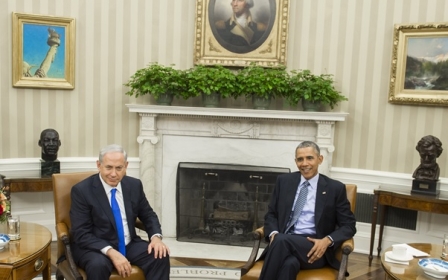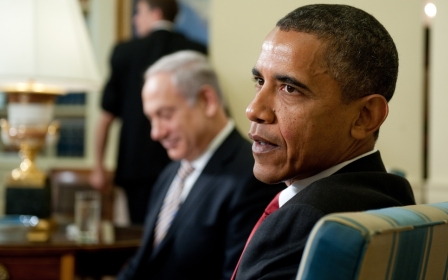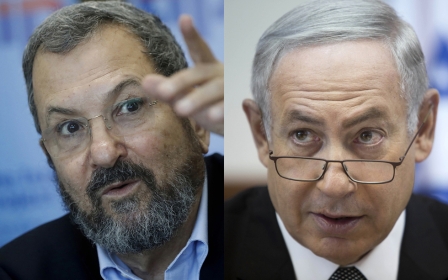The $38bn US-Israel deal that will do very little

The figures in the defence memorandum signed by the US and Israel in the past few days are quite staggering: $38bn of military aid over a period of 10 years. "The US has not signed such a deal with any other state,” was the proud remark of Yaakov Nagal, deputy head of Israel's National Security Council, who headed the Israeli delegation.
Nagal was right. With the most recent amount added to the $125bn which it has also received since the 1973 Yom Kippur War, Israel stands up as the undisputed world champion among foreign-aid receiving nations in modern history.
What could an F 35 warplane or the six submarines do against a Palestinian determined to stab an Israeli soldier or settler in the West Bank or East Jerusalem?
Yet despite the fact that the annual American aid rose from $3.1bn to $3.8bn, this aid package met with disappointment in Israel. Ehud Barak, a former prime minister and defence minister, was the most outspoken critic.
If Prime Minister Benyamin Netanyahu had not openly confronted the Obama administration on the Iran deal issue, Barak claimed in a frenetic series of interviews, Israel would have got a better deal: $45bn instead of $38bn.
If not for Netanyahu’s failed effort to convince the US Congress to vote against Obama, the US would have also supplied Israel with highly sophisticated warfare technology, he said.
Politics and arms
Barak's sharp critique has to do with politics. Seeing the void at the centre-left leadership in Israel, Barak is probably planning yet another political comeback as a frontrunner against Netanyahu. Challenging the prime minister on defense issues seems like useful tactics.
But his attacks have another motive: according to the current agreement with the US, Israel is entitled to spend a quarter of the American aid – around $850m annually - on purchasing products from its own local arms industries. This is something which has helped these industries to develop, making Israel the world's sixth-largest arms exporter, at $5.6bn in 2014.
Consequent American administrations have preferred that Israel spend much more of the huge aid it gets on American soil. President Barack Obama has succeeded where other presidents failed. According to the new agreement, in six years' time Israel will not be allowed to use its American aid money in order to promote its own weapon industries. No wonder that the strong lobby behind these industries in Israel – of which Barak is an integral part - opposes the deal.
Netanyahu, of course, rejects Barak's allegations. Israel could not have got a better deal, he claims, and his political dispute with Obama had no real effect on the final outcome.
America’s aircraft carrier
It is hard to rule who is right and who is wrong, yet one fact remains: Israel, a nation of eight million people with a GDP per capita of more than $36,000, gets almost 10 percent of all American foreign aid.
This seems to refute a common warning according to which Israel's move to the right would isolate it internationally. Israel has its most nationalistic government ever, yet it continues to get this generous aid. This is not how isolation looks like.
Israeli politicians, especially from the right wing, like to use the metaphor, coined in the times of the Cold War, of Israel being an American aircraft carrier in the Middle East. The new aid package seems to prove they are right.
In a series of briefings to all Israeli news outlets in the past weeks, Netanyahu reiterated his claims that Israel is now stronger than ever. According to Netanyahu, the international community has come to understand that Israel is an island of stability in a boiling Middle East. Netanyahu pointed out, rightly, that the Palestinian issue is far from being top priority on the world agenda.
His excellent ties with Egyptian President Abdel Fattah al-Sisi and improving relations with Saudi Arabia seem to prove, according to Netanyahu, that even the "moderate" Arab countries have come to the conclusion that Israel is an asset against Iranian-led "Islamic extremism" in the Middle East. In such a context, $38bn is a fair sum to insure Western interests in the region.
Even if not all world leaders share Netanyahu's views, it is clear there is wide consensus concerning Israel in the American political scene. While Republican presidential candidate Donald Trump keeps repeating that Israel is America's strongest ally, Democratic candidate Hillary Clinton told Israel's TV Channel 2 that it is the Palestinians who time and again have refused Israel's generous offers for peace.
Republican Senator Lindsey Graham went as far as criticising Netanyahu for accepting the aid deal with Obama because, according to Graham, the Israeli president could have got a better deal from either Clinton or Trump in the White House.
Israeli self-interest
It is less clear what actual effect this new deal will have on American or even Israeli policies in the Middle East. Even with its huge military power, Israel has had very little influence on the way the Syrian civil war has developed, even just 10km from its borders.
Israel has not prevented Russia from strengthening its position within the region, a process surely not favourable to American interests. With all his patriotic discourse, Trump may even give an ampler place to Russia in Syria once he is elected president.
Saudi Arabia may directly support rebel militias in Syria. Israel, which might topple the Syrian regime if it chose to, cannot do the same. Politically speaking, Israeli support is a liability in the Middle East, not an asset. The new aid deal will not change that.
Israel will continue to work for its own benefit in the Middle East, not for the benefit of the US or Europe. If the collaboration between Syrian President Bashar al-Assad and Iran ends victoriously in the Syrian civil war, Israel will have little power to mitigate the negative repercussions such a victory would have on the US-Saudi coalition in the region.
Status quo ante
More importantly, the billions of dollars poured into Israel will not really change the balance of power between it and the Palestinians.
For example, the new deal will enable Israel to buy 14 new F-35 stealth fighters, each worth $110m, in addition to the 21 planes it has already purchased. Yet this highly sophisticated aircraft will be of little use in the main battle ground which the Israeli army faces daily – the Palestinian arena.
What could an F-35 warplane or the six submarines bought from Germany for $1.5bn do against a Palestinian determined to stab an Israeli soldier or settler in the West Bank or East Jerusalem? If a new intifada breaks out in the West Bank or Gaza, $38bn in aid will be of little relevance to Israel.
More than military confrontation, the real threats for Israel are political. A UN Security Council resolution in favour of accepting Palestine as a full member state is more plausible than an all-out war with Iran or Syria, and the potential harm to Israeli positions may be greater.
The new military aid, huge as it may seem, may not encourage such a resolution, but it will certainly not reduce its chances. Therefore its influence on Israel's geopolitical standing is rather limited.
- Meron Rapoport is an Israeli journalist and writer, winner of the Napoli International Prize for Journalism for a inquiry about the stealing of olive trees from their Palestinian owners. He is a former head of the News Department of Haaertz, and is now an independent journalist.
The views expressed in this article belong to the author and do not necessarily reflect the editorial policy of Middle East Eye.
Photo: An Israeli soldier scuffles with a Palestinian woman who is trying to film the scene of a reported Palestinian stabbing attack on a soldier near the Jewish settler enclave of Tal Rumeda in the city centre of the West Bank town of Hebron on 16 September 2016 (AFP)
New MEE newsletter: Jerusalem Dispatch
Sign up to get the latest insights and analysis on Israel-Palestine, alongside Turkey Unpacked and other MEE newsletters
Middle East Eye delivers independent and unrivalled coverage and analysis of the Middle East, North Africa and beyond. To learn more about republishing this content and the associated fees, please fill out this form. More about MEE can be found here.





